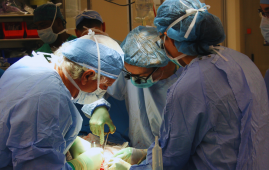

Not again, you may be thinking if you’ve come across the study by Zhong and colleagues, published in the March 15th issue of JAMA. Their question: Are eggs or cholesterol from foods associated with an increased risk of cardiovascular disease (CVD) or deaths from any cause? The study was a pooled analysis of data from six prospective studies that had followed 29,615 U.S. men and women for up to 31 years.
The findings:
- For every additional 300 mg of dietary cholesterol eaten per day, the risk of CVD and all-cause mortality was higher by 17% and 18%, respectively. These associations became nonsignificant after adjustment for the consumption of eggs and red meat. In the U.S. population, eggs and meats contribute 25% and 42% of total dietary cholesterol, respectively.
- For each additional half of an egg consumed daily, the risk of CVD and all-cause mortality was higher by 6% and 8%, respectively. When the authors looked more closely, dietary cholesterol intake was more strongly associated with risk of stroke than heart disease, and it was associated with both CVD and non-CVD deaths.
This study includes a relatively large sample and a long duration of follow-up. However, a major limitation is the use of a single measure of diet to look at outcomes up to 30 years later. During this time, some individuals may have changed their diet after developing high cholesterol or other conditions, which may influence the results of the study. These findings should be interpreted in the context of several previous studies, which have shown that low to moderate egg intake is not associated with a higher risk of CVD in generally healthy people.
“These new findings may rekindle the debate about the role of dietary cholesterol and egg consumption in cardiovascular disease, but would not change general healthy eating guidelines that emphasize increasing consumption of fruits, vegetables, whole grains, nuts, and legumes and lowering consumption of red and processed meats and sugar,” said Dr. Frank Hu, Chair of the Department of Nutrition at the Harvard Chan School of Public Health, who was not involved in the study. “For those who are generally healthy, low to moderate intake of eggs can be included as part of a healthy eating pattern, but they are not essential. For example, there is a range of other foods one can choose for a variety of healthful breakfasts, such as whole-grain toast with nut butter, fresh fruits, and plain yogurt.”
more recommended stories
 Texas Medical Board Releases Abortion Training for Physicians
Texas Medical Board Releases Abortion Training for PhysiciansKey Takeaways Texas Medical Board has.
 Safer Allogeneic Stem Cell Transplants with Treg Therapy
Safer Allogeneic Stem Cell Transplants with Treg TherapyA new preclinical study from the.
 Autoimmune Disorders: ADA2 as a Therapeutic Target
Autoimmune Disorders: ADA2 as a Therapeutic TargetAdenosine deaminase 2 (ADA2) has emerged.
 Kaempferol: A Breakthrough in Allergy Management
Kaempferol: A Breakthrough in Allergy ManagementKaempferol, a dietary flavonoid found in.
 Early Milk Cereal Drinks May Spur Infant Weight Gain
Early Milk Cereal Drinks May Spur Infant Weight GainNew research published in Acta Paediatrica.
 TaVNS: A Breakthrough for Chronic Insomnia Treatment
TaVNS: A Breakthrough for Chronic Insomnia TreatmentA recent study conducted by the.
 First-of-Its-Kind Gene-Edited Pig Kidney: Towana’s New Life
First-of-Its-Kind Gene-Edited Pig Kidney: Towana’s New LifeSurgeons at NYU Langone Health have.
 Just-in-Time Training Improves Success & Patient Safety
Just-in-Time Training Improves Success & Patient SafetyA study published in The BMJ.
 ChatGPT Excels in Medical Summaries, Lacks Field-Specific Relevance
ChatGPT Excels in Medical Summaries, Lacks Field-Specific RelevanceIn a recent study published in.
 Study finds automated decision minimizes high-risk medicine combinations in ICU patients
Study finds automated decision minimizes high-risk medicine combinations in ICU patientsA multicenter study coordinated by Amsterdam.

Leave a Comment